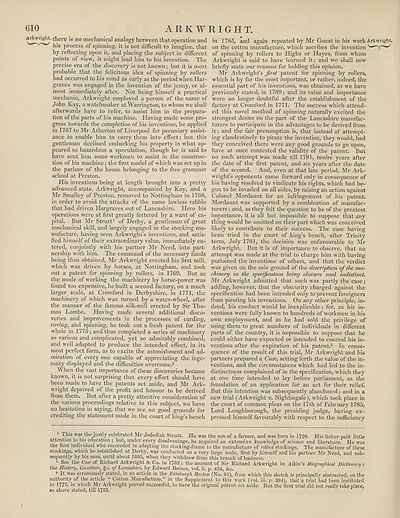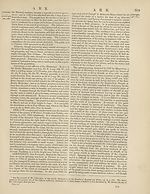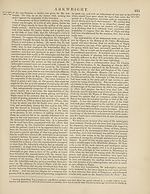Encyclopaedia Britannica > Volume 3, Anatomy-Astronomy
(618) Page 610
Download files
Complete book:
Individual page:
Thumbnail gallery: Grid view | List view

610 ARKWRIGHT.
Arkwright. t^ere ;s no mechanica] analogy between that operation and
his process of spinning, it is not difficult to imagine, that
by reflecting upon it, and placing the subject in different
points of view, it might lead him to his invention. The
precise era of the discovery is not known; but it is most
probable that the felicitous idea of spinning by rollers
had occurred to his mind as early as the period when Har¬
graves was engaged in the invention of the jenny, or al¬
most immediately after. Not being himself a practical
mechanic, Arkwright employed a person of the name of
John Kay, a watchmaker at Warrington, to whom we shall
afterwards have to refer, to assist him in the prepara¬
tion of the parts of his machine. Having made some pro¬
gress towards the completion of his inventions, he applied
in 1767 to Mr Atherton of Liverpool for pecuniary assist¬
ance to enable him to carry them into effect; but this
gentleman declined embarking his property in what ap¬
peared so hazardous a speculation, though he is said to
have sent him some workmen to assist in the construc¬
tion of his machine ; the first model of which was set up in
the parlour of the house belonging to the free grammar
school at Preston.
His inventions being at length brought into a pretty
advanced state, Arkwright, accompanied by Kay, and a
Mr Smalley of Preston, removed to Nottingham in 1768,
in order to avoid the attacks of the same lawless rabble
that had driven Hargraves out of Lancashire. Here his
operations were at first greatly fettered by a want of ca¬
pital. But Mr Strutt1 of Derby, a gentleman of great
mechanical skill, and largely engaged in the stocking ma¬
nufacture, having seen Arkwright’s inventions, and satis¬
fied himself of their extraordinary value, immediately en¬
tered, conjointly with his partner Mr Need, into part¬
nership with him. The command of the necessary funds
being thus obtained, Mr Arkwright erected his first mill,
which was driven by horses, at Nottingham, and took
out a patent for spinning by rollers, in 1769. But as
the mode of working the machinery by horse-power was
found too expensive, he built a second factory, on a much
larger scale, at Cromford in Derbyshire, in 1771, the
machinery of which was turned by a water-wheel, after
the manner of the famous silk-mill erected by Sir Tho¬
mas Lombe. Having made several additional disco¬
veries and improvements in the processes of carding,
roving, and spinning, he took out a fresh patent for the
whole in 1775 ; and thus completed a series of machinery
so various and complicated, yet so admirably combined,
and well adapted to produce the intended effect, in its
most perfect form, as to excite the astonishment and ad¬
miration of every one capable of appreciating the inge¬
nuity displayed and the difficulties overcome.2
When the vast importance of these discoveries became
known, it is not surprising that every effort should have
been made to have the patents set aside, and Mr Ark¬
wright deprived of the profit and honour to be derived
from them. But after a pretty attentive consideration of
the various proceedings relative to this subject, we have
no hesitation in saying, that we see no good grounds for
crediting the statement made in the court of king’s bench
in 1785, and again repeated by Mr Guest in his work Arkwright.
on the cotton manufacture, which ascribes the invention
of spinning by rollers to Highs or Hayes, from whom
Arkwright is said to have learned it; and we shall now
briefly state our reasons for holding this opinion.
Mr Arkwright’s Jirst patent for spinning by rollers,
which is by far the most important, or rather, indeed, the
essential part of his inventions, was obtained, as we have
previously stated, in 1769; and its value and importance
were no longer doubtful after the establishment of the
factory at Cromford in 1771. The success which attend¬
ed this novel method of spinning naturally excited the
strongest desire on the part of the Lancashire manufac¬
turers to participate in the advantages to be derived from
it; and the fair presumption is, that instead of attempt¬
ing clandestinely to pirate the invention, they would, had
they conceived there were any good grounds to go upon,
have at once contested the validity of the patent. But
no such attempt was made till 1781, twelve years after
the date of the first patent, and six years after the date
of the second. And, even at that late period, Mr Ark¬
wright’s opponents came forward only in consequence of
his having resolved to vindicate his rights, which had be¬
gun to be invaded on all sides, by raising an action against
Colonel Mordaunt for an infringement of his patent.
Mordaunt was supported by a combination of manufac¬
turers ; and, as they felt the question to be of the greatest
importance, it is all but impossible to suppose that any
thing would be omitted on their part which was conceived
likely to contribute to their success. The case having
been tried in the court of king’s bench, after Trinity
term, July 1781, the decision was unfavourable to Mr
Arkwright. But it is of importance to observe, that no
attempt was made at the trial to charge him with having
purloined the inventions of others, and that the verdict
was given on the sole ground of the description of the ma¬
chinery in the specification being obscure and indistinct.
Mr Arkwright admitted that such was partly the case;
adding, however, that the obscurity charged against the
specification had been intended only to prevent foreigners
from pirating his inventions. On any other principle, in¬
deed, his conduct would be inexplicable; for, as his in¬
ventions were fully known to hundreds of workmen in his
own employment, and as he had sold the privilege of
using them to great numbers of individuals in different
parts of the country, it is impossible to suppose that he
could either have expected or intended to conceal his in¬
ventions after the expiration of his patent.3 In conse¬
quence of the result of this trial, Mr Arkwright and his
partners prepared a Case, setting forth the value of the in¬
ventions, and the circumstances which had led to the in¬
distinctness complained of in the specification, which they
at one time intended to lay before parliament, as the
foundation of an application for an act for their relief.
But this intention was subsequently abandoned; and in a
new trial (Arkwright v. Nightingale), which took place in
the court of common pleas on the 17th of February 1785,
Lord Loughborough, the presiding judge, having ex¬
pressed himself favourably with respect to the sufficiency
This was the justly celebrated Mr Jedediah Strutt. He was the son of a farmer, and was born in 1726. His father paid little
attentumtohiseducatum ; but, under every disadvantage, he acquired an extensive knowledge of science and literature. He was
the first individual who succeeded in adapting the stocking-frame to the manufacture of ribbed stockings. The manufacture of these
stockings, which he established at Derby, was conducted on a very large scale, first by himself and his partner Mr Need, and sub¬
sequently by his sons, until about 1805, when they withdrew from this branch of business.
See the Case of Richard Arkwright & Co. in 1782 ; the account of Sir Richard Arkwright in Aikin’s Biographical Dictiovary;
the History, Gazetteer, S[C. of Lancashire, by Edward Baines, vol. ii. p. 484, &c.
3 It was erroneously stated, in an article in the Edinburgh Review (No. 91), from which this sketch is principally abstracted, on the
authority of the article Cotton Manufacture, in the Supplement to this work (vol. iii. p. 394), that a trial had been instituted
in 1772, in which Mr Arkwright proved successful, to have the original patent set aside. But the first trial did not really take place,
as above stated, till 1781.
Arkwright. t^ere ;s no mechanica] analogy between that operation and
his process of spinning, it is not difficult to imagine, that
by reflecting upon it, and placing the subject in different
points of view, it might lead him to his invention. The
precise era of the discovery is not known; but it is most
probable that the felicitous idea of spinning by rollers
had occurred to his mind as early as the period when Har¬
graves was engaged in the invention of the jenny, or al¬
most immediately after. Not being himself a practical
mechanic, Arkwright employed a person of the name of
John Kay, a watchmaker at Warrington, to whom we shall
afterwards have to refer, to assist him in the prepara¬
tion of the parts of his machine. Having made some pro¬
gress towards the completion of his inventions, he applied
in 1767 to Mr Atherton of Liverpool for pecuniary assist¬
ance to enable him to carry them into effect; but this
gentleman declined embarking his property in what ap¬
peared so hazardous a speculation, though he is said to
have sent him some workmen to assist in the construc¬
tion of his machine ; the first model of which was set up in
the parlour of the house belonging to the free grammar
school at Preston.
His inventions being at length brought into a pretty
advanced state, Arkwright, accompanied by Kay, and a
Mr Smalley of Preston, removed to Nottingham in 1768,
in order to avoid the attacks of the same lawless rabble
that had driven Hargraves out of Lancashire. Here his
operations were at first greatly fettered by a want of ca¬
pital. But Mr Strutt1 of Derby, a gentleman of great
mechanical skill, and largely engaged in the stocking ma¬
nufacture, having seen Arkwright’s inventions, and satis¬
fied himself of their extraordinary value, immediately en¬
tered, conjointly with his partner Mr Need, into part¬
nership with him. The command of the necessary funds
being thus obtained, Mr Arkwright erected his first mill,
which was driven by horses, at Nottingham, and took
out a patent for spinning by rollers, in 1769. But as
the mode of working the machinery by horse-power was
found too expensive, he built a second factory, on a much
larger scale, at Cromford in Derbyshire, in 1771, the
machinery of which was turned by a water-wheel, after
the manner of the famous silk-mill erected by Sir Tho¬
mas Lombe. Having made several additional disco¬
veries and improvements in the processes of carding,
roving, and spinning, he took out a fresh patent for the
whole in 1775 ; and thus completed a series of machinery
so various and complicated, yet so admirably combined,
and well adapted to produce the intended effect, in its
most perfect form, as to excite the astonishment and ad¬
miration of every one capable of appreciating the inge¬
nuity displayed and the difficulties overcome.2
When the vast importance of these discoveries became
known, it is not surprising that every effort should have
been made to have the patents set aside, and Mr Ark¬
wright deprived of the profit and honour to be derived
from them. But after a pretty attentive consideration of
the various proceedings relative to this subject, we have
no hesitation in saying, that we see no good grounds for
crediting the statement made in the court of king’s bench
in 1785, and again repeated by Mr Guest in his work Arkwright.
on the cotton manufacture, which ascribes the invention
of spinning by rollers to Highs or Hayes, from whom
Arkwright is said to have learned it; and we shall now
briefly state our reasons for holding this opinion.
Mr Arkwright’s Jirst patent for spinning by rollers,
which is by far the most important, or rather, indeed, the
essential part of his inventions, was obtained, as we have
previously stated, in 1769; and its value and importance
were no longer doubtful after the establishment of the
factory at Cromford in 1771. The success which attend¬
ed this novel method of spinning naturally excited the
strongest desire on the part of the Lancashire manufac¬
turers to participate in the advantages to be derived from
it; and the fair presumption is, that instead of attempt¬
ing clandestinely to pirate the invention, they would, had
they conceived there were any good grounds to go upon,
have at once contested the validity of the patent. But
no such attempt was made till 1781, twelve years after
the date of the first patent, and six years after the date
of the second. And, even at that late period, Mr Ark¬
wright’s opponents came forward only in consequence of
his having resolved to vindicate his rights, which had be¬
gun to be invaded on all sides, by raising an action against
Colonel Mordaunt for an infringement of his patent.
Mordaunt was supported by a combination of manufac¬
turers ; and, as they felt the question to be of the greatest
importance, it is all but impossible to suppose that any
thing would be omitted on their part which was conceived
likely to contribute to their success. The case having
been tried in the court of king’s bench, after Trinity
term, July 1781, the decision was unfavourable to Mr
Arkwright. But it is of importance to observe, that no
attempt was made at the trial to charge him with having
purloined the inventions of others, and that the verdict
was given on the sole ground of the description of the ma¬
chinery in the specification being obscure and indistinct.
Mr Arkwright admitted that such was partly the case;
adding, however, that the obscurity charged against the
specification had been intended only to prevent foreigners
from pirating his inventions. On any other principle, in¬
deed, his conduct would be inexplicable; for, as his in¬
ventions were fully known to hundreds of workmen in his
own employment, and as he had sold the privilege of
using them to great numbers of individuals in different
parts of the country, it is impossible to suppose that he
could either have expected or intended to conceal his in¬
ventions after the expiration of his patent.3 In conse¬
quence of the result of this trial, Mr Arkwright and his
partners prepared a Case, setting forth the value of the in¬
ventions, and the circumstances which had led to the in¬
distinctness complained of in the specification, which they
at one time intended to lay before parliament, as the
foundation of an application for an act for their relief.
But this intention was subsequently abandoned; and in a
new trial (Arkwright v. Nightingale), which took place in
the court of common pleas on the 17th of February 1785,
Lord Loughborough, the presiding judge, having ex¬
pressed himself favourably with respect to the sufficiency
This was the justly celebrated Mr Jedediah Strutt. He was the son of a farmer, and was born in 1726. His father paid little
attentumtohiseducatum ; but, under every disadvantage, he acquired an extensive knowledge of science and literature. He was
the first individual who succeeded in adapting the stocking-frame to the manufacture of ribbed stockings. The manufacture of these
stockings, which he established at Derby, was conducted on a very large scale, first by himself and his partner Mr Need, and sub¬
sequently by his sons, until about 1805, when they withdrew from this branch of business.
See the Case of Richard Arkwright & Co. in 1782 ; the account of Sir Richard Arkwright in Aikin’s Biographical Dictiovary;
the History, Gazetteer, S[C. of Lancashire, by Edward Baines, vol. ii. p. 484, &c.
3 It was erroneously stated, in an article in the Edinburgh Review (No. 91), from which this sketch is principally abstracted, on the
authority of the article Cotton Manufacture, in the Supplement to this work (vol. iii. p. 394), that a trial had been instituted
in 1772, in which Mr Arkwright proved successful, to have the original patent set aside. But the first trial did not really take place,
as above stated, till 1781.
Set display mode to:
![]() Universal Viewer |
Universal Viewer | ![]() Mirador |
Large image | Transcription
Mirador |
Large image | Transcription
Images and transcriptions on this page, including medium image downloads, may be used under the Creative Commons Attribution 4.0 International Licence unless otherwise stated. ![]()
| Encyclopaedia Britannica > Encyclopaedia Britannica > Volume 3, Anatomy-Astronomy > (618) Page 610 |
|---|
| Permanent URL | https://digital.nls.uk/193765382 |
|---|
| Attribution and copyright: |
|
|---|---|
| Shelfmark | EB.16 |
|---|---|
| Description | Ten editions of 'Encyclopaedia Britannica', issued from 1768-1903, in 231 volumes. Originally issued in 100 weekly parts (3 volumes) between 1768 and 1771 by publishers: Colin Macfarquhar and Andrew Bell (Edinburgh); editor: William Smellie: engraver: Andrew Bell. Expanded editions in the 19th century featured more volumes and contributions from leading experts in their fields. Managed and published in Edinburgh up to the 9th edition (25 volumes, from 1875-1889); the 10th edition (1902-1903) re-issued the 9th edition, with 11 supplementary volumes. |
|---|---|
| Additional NLS resources: |
|

